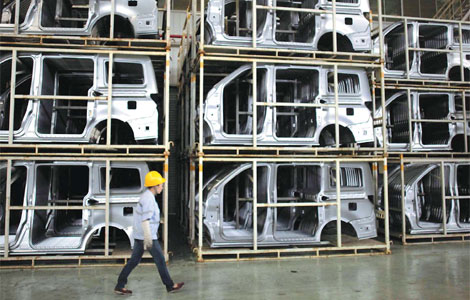Upgrading food safety
Updated: 2013-06-18 08:14
(China Daily)
|
|||||||||||
China's top legislature adopted the country's first food safety law in the first half of 2009, months after milk contaminated with melamine killed six infants and sickened 300,000 others.
Now the country's food safety watchdog is pushing to revise the law, in a move aimed at plugging the legal loopholes and curbing the pervasive malpractices in the food production and sale chain.
The China Food and Drug Administration recently said that it has gathered opinions from experts on revising the Food Safety Law and will strive to draft an amendment by the end of this year to set up the "harshest-ever legal monitoring and management system on food and drug safety".
Such a vow came after a series of food scandals across the country and repeated reiterations made by the top authorities to crack down on fake and contaminated foods.
The intensive exposure of food safety scandals in recent months, ranging from the production and sale of rice with high levels of cadmium in Guangdong province and the sale of ginger contaminated by a highly toxic pesticide in Shandong province to the sale of fake mutton in some local markets and the latest case involving the production of preserved eggs with industry-grade cupric sulfate in Jiangxi province, has aroused severe public concern and fuelled discontent with the food safety watchdog.
At a nationwide television conference in May, Premier Li Keqiang vowed strict market supervision and harsh penalties to ensure food safety and said "the perpetrators must pay a high price that they cannot afford", a stance that he has stressed again on several occasions in recent months.
According to the authorities, the upcoming revisions to the Food Safety Law may include harsher punishments for violations and new regulations on areas that aren't covered by the current law.
Facing mounting public fury over the seemingly endless food safety scandals, it is indeed necessary for the authorities to adopt a harsher statute to mete out deserved punishments to the perpetrators.
However, the biggest problem facing China's chaotic food market is not the absence of relevant legal clauses alone. Feeble market supervision and enforcement are also contributory factors. The country should make efforts to strengthen these even with a harsher food safety law in place in the future.
Related Stories
Food-safety offenders to receive harsher penalties 2013-06-18 02:18
New tech can help to keep food safe 2013-06-18 01:19
Food poisoning sickens 70 in S China 2013-06-17 23:12
Joint efforts urged to ensure food safety 2013-06-17 22:49
Revisions to food safety laws 'urgently' needed 2013-06-15 07:53
Today's Top News
China rejects Snowden spying claims
Putin, Obama face off over Syria
China to hold talks with DPRK
3 charged over attack on Chinese
G8 kicks off amid controversy
Travel becomes a family affair
Weibo draws more than just locals
New tech can help to keep food safe
Hot Topics
Lunar probe , China growth forecasts, Emission rules get tougher, China seen through 'colored lens', International board,
Editor's Picks

|

|

|

|

|

|





